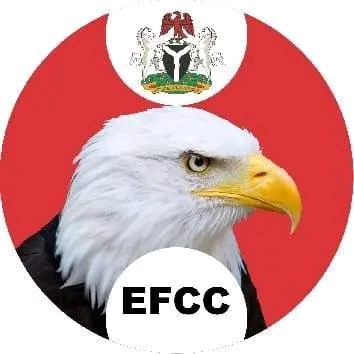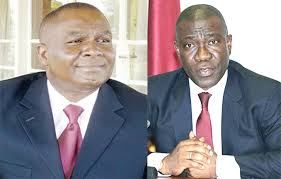Salary
EFCC Salary Structure, Ranks and Divisions

If you’re a interested in joining the Economic and Financial Crimes Commission (EFCC) or simply curious about EFCC salary Structure, how much EFCC officers earn, their ranks, and divisions, then you’re in the right place.
This comprehensive guide breaks down the EFCC salary structure, current ranks, recruitment opportunities, and the functions of each division within the agency. Whether you’re a student considering a career in anti-corruption, a job seeker, or just someone curious about EFCC jobs in Nigeria, read on to learn everything you need to know.
Overview of the EFCC
The Economic and Financial Crimes Commission (EFCC) is Nigeria’s leading law enforcement agency, established in the year 2003 to combat economic and financial crimes such as advance fee fraud (419), money laundering, embezzlement, terrorism financing, and corruption.
Currently one of the most powerful anti-corruption bodies in Africa, the EFCC plays a vital role in Nigeria’s justice and law enforcement system. Working with international organizations like Interpol, FBI, and UNODC, EFCC agents are highly trained, respected, and well-compensated.
EFCC Salary Structure in Nigeria (Latest Update)
The EFCC salary structure is largely influenced by the level of qualification, years of service, rank, and department. The commission adopts a payment model that is similar to other paramilitary and law enforcement agencies in Nigeria, such as the Nigerian Police Force and the Nigerian Immigration Service.
Here’s a breakdown of the average monthly salaries for different EFCC ranks:
Entry-Level Staff (Detective Assistants, Cadets)
- Monthly Salary: ₦105,000 – ₦145,000
- Annual Salary: ₦1.2 million – ₦1.7 million
Graduate Cadre (Assistant Detective Superintendent)
- Monthly Salary: ₦160,000 – ₦200,000
- Annual Salary: ₦1.9 million – ₦2.4 million
Mid-Level Officers (Detective Inspectors, Senior Detectives)
- Monthly Salary: ₦210,000 – ₦250,000
- Annual Salary: ₦2.5 million – ₦3 million
Senior Officers (Detective Superintendent, Chief Inspector)
- Monthly Salary: ₦280,000 – ₦350,000
- Annual Salary: ₦3.3 million – ₦4.2 million
Top Management (Director, Head of Division)
- Monthly Salary: ₦450,000 – ₦750,000
- Annual Salary: ₦5.4 million – ₦9 million
EFCC Ranks and Hierarchy
Like many Nigerian law enforcement agencies, the EFCC operates a rank-based system. Officers are promoted based on years of service, performance, training, and educational qualifications.
Here is the current EFCC structure rank from lowest to highest:
1. Detective Assistant (DA)
- Entry-level position for SSCE holders or diploma holders.
- Usually undergo basic training at the EFCC Academy.
2. Detective Inspector (DI)
- Requires National Diploma (ND) or NCE.
- Supervisory role over DA rank.
3. Assistant Detective Superintendent (ADS)
- Entry rank for university graduates.
- Cadet officers begin at this level.
4. Detective Superintendent (DS)
- Requires at least 5 years of experience.
- Involves investigations and case oversight.
5. Senior Detective Superintendent (SDS)
6. Principal Detective Superintendent (PDS)
7. Assistant Director (AD)
8. Deputy Director (DD)
9. Director (D)
- Highest-ranking officer in a department.
- Reports directly to the Chairman of EFCC.
10. Executive Chairman
- Usually appointed by the President of Nigeria.
- Oversee all EFCC operations nationwide.
EFCC Divisions and Departments
The EFCC has several specialized divisions and units responsible for handling various financial crimes and administrative duties. Below are the major EFCC departments:
1. Operations Department
- Main investigative arm of the EFCC.
- Handles arrest, surveillance, prosecution, and asset recovery.
2. Legal and Prosecution Department
- Works with lawyers and courts to prosecute offenders.
- Ensure that all arrests follow due process.
3. Economic Governance Department
- Targets high-profile government-related corruption.
- Investigates public office holders.
4. Cybercrime Division
- Tracks and investigates online fraud, hacking, and cyber-financial crimes.
- They frequently work with tech companies and international agencies.
5. Forensic and Intelligence Unit
- Handles technical analysis, digital forensics, and intelligence gathering.
6. Media and Public Affairs Department
- Manage public communication and media relations.
- Educates Nigerians on the dangers of financial crimes.
7. Training and Research Institute
- Located in Karu, Abuja.
- Trains new recruits and conducts anti-corruption research.
Requirements to Join EFCC in Nigeria
To join the EFCC, you must meet the basic requirements depending on your desired position:
General Requirements
- Must be a Nigerian citizen.
- Must not be older than 27 years (for entry-level roles).
- No criminal record.
- Physically and mentally fit.
- NYSC discharge certificate (for graduates).
- And must pass the EFCC aptitude test and interview.
Educational Qualifications
- Detective Assistant: SSCE / NECO / GCE
- Detective Inspector: ND / NCE
- Assistant Detective Superintendent: B.Sc. / HND
Latest EFCC Recruitment Updates
The EFCC recruitment portal usually when recruitment is intended. We will update you once its open and you can also monitor the official EFCC website or verified media outlets for updates. Recruitment usually happens every 2–3 years and includes aptitude tests, interviews, medical tests, and background checks.
Read Also: Nigerian Air force Ranks and Salary Structure
FAQs About EFCC Salary, Ranks, and Recruitment
How much is EFCC salary per month?
EFCC officers earn between ₦105,000 to ₦750,000 monthly depending on rank and years of service.
What is the EFCC starting salary?
Entry-level officers (Detective Assistants and Cadets) earn about ₦105,000 – ₦145,000 monthly.
What rank is given to a graduate in EFCC?
University graduates typically start as Assistant Detective Superintendents (ADS).
Is EFCC under federal government?
Yes. The EFCC is a federal agency under the presidency of Nigeria and operates independently under the EFCC Act.
Does EFCC go for training?
Yes. All new recruits undergo intensive training at the EFCC Academy in Abuja, focusing on investigation techniques, law, self-defense, and forensic analysis.
Can HND holders join EFCC?
Yes, HND holders can join and typically begin at the rank of Assistant Detective Superintendent after completing cadet training.
Why EFCC is a Competitive Career Choice in Nigeria
Choosing a career in EFCC offers many advantages, including:
- Stable government job with benefits
- Opportunity to serve Nigeria by fighting corruption
- International exposure through partnerships
- Career growth through promotions and training
- Competitive salary and allowances
Conclusion
The EFCC remains one of Nigeria’s most important institutions in the fight against corruption. Understanding the EFCC salary structure, ranks, and divisions is essential for anyone interested in joining or learning more about the agency.
Whether you’re a student considering law enforcement, or a professional seeking a meaningful career path, the EFCC offers an exciting and challenging opportunity to make a real difference in Nigeria.



























